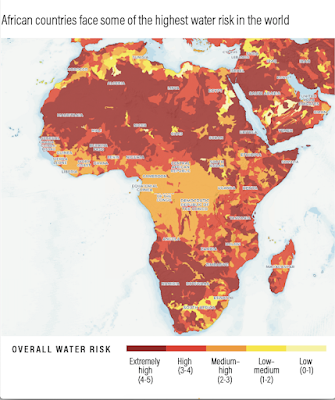Hey everyone! Welcome to my first ever blog post, where I will be discussing food and water in Africa! Across the first academic term, I will be writing weekly entries concentrating on the broad subject of water and food in Africa. The overall purpose is to guide you through a selection of issues and to exhibit responses that address both water and food security in Africa.
The significance of water
Water is a necessity. It is essential for survival, development, agricultural systems and ecosystems globally. Covering 71% of the earth's surface, it is surprising that water scarcity affects more than 40% of people worldwide . Significantly, only 3% of the 71% is freshwater and just 1.2% is drinkable. Moreover, drinkable water is unevenly distributed, causing a problem in areas with a lower supply and leaving Africa to face some of the highest water risk in the world (Figure 1; Figure 2). This proves to be problematic for Africa as the continent holds just 9% of the world's total renewable freshwater despite supporting 20% of the global population. Comparatively, the United States stores 8% renewable freshwater to share amongst a small 4.5% of the world's population.
Furthermore, worldwide population growth has tripled the demand for freshwater placing pressure on water systems. As fresh water demand in Africa is needed more than ever due to continued population growth and pressures of climate change, it is critical that water is managed sustainably, especially when it is predicted that by 2050 more than 1 in 4 will experience recurring shortages of water.
Figure 1: Freshwater availability per person in countries around the world, in 2007.
Figure 2: A map showing water risk of African countries.
The significance of Africa
54 countries. 3000 ethnic groups. 2000 languages. Africa is a diverse place, which makes it an interesting focal point, especially for studying food and water. Over the next 30 years, the world's population is expected to reach almost 10.2 billion, 34% higher than it is now, causing an incredible strain on an already struggling water system. The majority of this population growth is projected to occur within Africa (+1.3 billion people), where water scarcity is already a deep-rooted issue. In the next section of this blog post I will explain why this is so detrimental with regards to food production.
When looking at Africa it is not just the social characteristics of the continent that makes it so fascinating. The continent has diverse topography and geology which makes it a unique location when considering the potential of groundwater in achieving both water and food security. This is noteworthy since there are several countries in Africa that are considered water scarce, because of a lack of renewable freshwater relative to demand. Additionally, Africa has the most varied river discharges and precipitation patterns globally, causing distinctive wet and dry seasons (Figure 3).
 |
| Figure 3: A map showing mean annual precipitation in Africa. |
The significance of food
Food is also a necessity and like us, food needs water to grow. The sustainable development goal (SDG) 2 is “ to end hunger, achieve food security and improve nutrition and promote sustainable agriculture globally by 2030’ . This goal is significant for Africa, because despite the fact that over 83% of the continent's freshwater withdrawal is for agricultural purposes, Africa has the lowest per capita rates of food production globally. Moreover, with the projected dramatic increase in population, the demand for water in the African agricultural industry is projected to increase by 800% by 2050. Today, the five African regions depend on trade and aid to prevent systematic food shortages, consequently to their negative food balances. In the future, this dependence looks likely to increase. Therefore, it is important to resolve water scarcity to ensure food security and to work towards achieving SDG 2.
Overall, water and food in Africa is an important research topic, due to population growth, urbanisation and environmental change. Please consider watching the video below, which I strongly recommend, to gain a deeper understanding of the complex nature of this topic.


Good introduction with well presented engagement with facts and literatures. Also references are well embeded.
ReplyDeleteHi Summer!
ReplyDeleteYou predict the dependence of African region's on trade and aid to prevent systematic food shortages is likely to increase- could you provide further information on this? What do you think will motivate this increase? For me, I think climate change will play a large role.
I look forward to reading more of your posts in the future!